Summer Reading for YOU
June 14th, 2013 // 10:56 am @ Oliver DeMille
5 Recommended Books for the Summer
by Oliver DeMille
“Dad, can you read to me more?” Meri asked me.
Surprised, I looked up from my book and responded, “Oh, sure.”
I took the book she was reading and read a chapter aloud to her. When I finished, I handed her the book.
“Thanks, Dad,” she said. “I could have read it myself, but I just love it when you read. I mean, in the winter you read to us a lot, and with all our classes and other activities it seems like I learn a lot from you, and all my other teachers.
“In the summer is when Mom reads to us the most, out on the couch on the porch, but I don’t learn as much from other people, and it seems like you don’t read to us as often.”
Meri walked away with her book, but our little conversation got me thinking. I’ve always taught that winter is the key time for family reading. But I think that summer is the most important time for kids to see their parents reading—mainly because they tend to spend less time on official “schooling” activities and more relaxed time with parents (and observing their parents’ leisure activity choices) during the summer months.
When children and youth see their parents reading a lot, they naturally value reading. When children and youth value reading, they read more.
Our choices during summer to make a huge difference in the education of our kids, and one of the most impactful things a parent can do is set the example of reading. If your kids see you reading books a lot, especially during summer leisure, not only are you filling your bucket of ideas and resources, but the example you set can drastically influence them. Reading is powerful!
On the national scale, all free societies are reading societies, and reading starts in the home!
Here’s a great summer reading list* that I’m following. I’m making sure all my children and youth see me reading these books this summer. And I’m really going deep—by reading with a highlighter and pen, taking notes and marking quotes as I go. I’m sharing these books because I hope you’ll do the same:
The Early History of Rome, by Livy
 This great book isn’t part of the Great Books of Western Civilization, but it could be. I want my children and youth to see that I care about history, and I’ll look for opportunities to share Livy’s stories with them and talk about the connection between reading history and being successful leaders in life.
This great book isn’t part of the Great Books of Western Civilization, but it could be. I want my children and youth to see that I care about history, and I’ll look for opportunities to share Livy’s stories with them and talk about the connection between reading history and being successful leaders in life.
Rascal, by Chris Brady
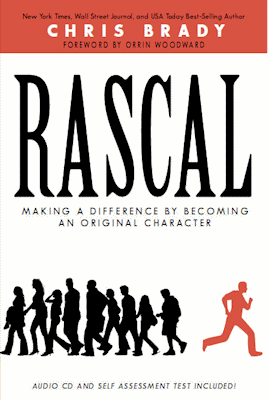 I want my kids to know what a “rascal” is–at least the way Brady defines it. I want them to be the kind of people this book promotes, and I can’t wait for them to ask me about this book.
I want my kids to know what a “rascal” is–at least the way Brady defines it. I want them to be the kind of people this book promotes, and I can’t wait for them to ask me about this book.
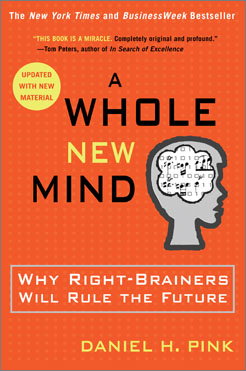 A Whole New Mind, by Daniel Pink
A Whole New Mind, by Daniel Pink
I want my youth to be innovative, creative, and have initiative. This is one of the hardest things to teach, but I’ll look for opportunities to discuss these things as I read this book.
Isaiah, in the Bible
I love sharing scriptural verses with the kids and discussing the meanings and lessons. It leads to a lot of important conversations with the kids about the most important topics.
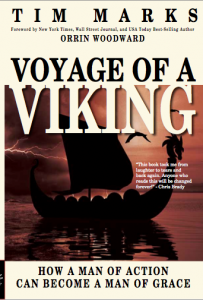 Voyage of a Viking, by Tim Marks
Voyage of a Viking, by Tim Marks
I can’t wait to talk to my kids and youth about this book! It’s about seeking for greatness, learning from your mistakes, not settling for mediocrity, and constantly improving yourself. I know the title of this book will have all my kids asking me questions about it!
Chillin’ and Grillin’
This week I’ve been reading these books in the evenings outside by the grill and the court where the kids play basketball, in the hot afternoons near the swamp cooler, and in the kitchen before meals and during cleanup after the family eats. I’ve taken turns with each book, so I’m a few chapters into all five of them, but I’ve had more than one discussion about each with the kids.
Tonight as dinner started, I got everyone’s attention and said, “I’m reading this awesome book. Actually, I’ve read it before but I’m re-reading it and I want to share something from it that really touched me.”
Everyone quieted down and listened. “Here goes,” I said. Then I read from Voyage of a Viking:
Kids can be pretty relentless in teasing one another, and the kids in my school were no different. I had never before been the subject of teasing and bullying, so it was a new experience for me. You see, news of my parents’ divorce got around town pretty quickly, and it wasn’t too long before the news hit my schoolyard.
The little kids in the family were leaning forward at full attention, and even the teens were paying close attention. I kept reading:
And then the teasing began. ‘There’s Tim, and he doesn’t have a dad,’ the kids would whisper to each other and taunt me.
I stopped reading and asked, “How would that make you feel?”
“I’d hate it!” Meri said forcefully. The other kids agreed.
After they shared their feelings, I asked, “Have you ever been teased like that?” We discussed this for a while, then I asked everyone, “Okay, I have another question. Have you ever teased anyone this way?”
“No way!” Meri exclaimed. She is nothing if not earnest.
“Are you sure?” I asked slowly.
Everyone considered. “Well, actually,” Meri said, then she told several stories of when she wasn’t very nice to people in her life. The other kids shared too, and we had a great conversation about being good friends and also standing up against bullying even when the victim isn’t your friend.
When I read what happened next in the book, everyone got even more interested. You’ve got to read it to get it! We spent dinner talking about this and discussing it.
At the end, I said, “I’m so excited to read the rest of this book.”
“Me too,” America said emphatically. “Meri” is nine years old, and she loves to read. I don’t know when she’ll read Voyage of a Viking, but I’ll be sharing from it and the others on my list all summer.
Actually, I’m having a hard time reading it because after our dinner discussion my visiting twenty-year old daughter Sara borrowed my copy and is reading it. Oh well, she reads fast. In the meantime, I’ve got the other four books.
Tomorrow at breakfast I’m planning to share the following quote from Livy, where he says that he is excited to write about Rome because, as he puts it:
I shall be able to turn my eyes from the troubles which for so long have tormented the modern world.
I’ll ask the family, “Why do you think people always feel that the modern, current world is so chaotic and hard and that the people in history somehow had things more simple? I mean, Livy thought this clear back in the time of Jesus Christ.”
This question is more for the teenagers, while yesterday’s conversation was perhaps more accessible to the younger kids. But everyone takes part in all of it. The older ones (me included!) bear reminding about Core Phase issues, and the younger ones benefit immensely by being including in the discussion of “serious” topics of academic and intellectual interest.
I could go on and on sharing examples of how to do this, but I’ve got a book calling to me. I’ve finished work for the day, and I want to read in the yard this evening—so I’ll be near the kids and we can talk.
Maybe I’ll teach them from one of these five books I’m reading, or maybe Meri will bring me a book of her own to read and talk about. Or perhaps we’ll all just sit in the warm evening and watch the sunset and talk. I often have the stack of all five books around with me, so I can just pick and choose which to read and share.
In any case, I’m excited to keep reading and sharing my book list this summer. This first week has been great. I can’t wait to see what we’ll learn about together in the months ahead.
Summer is a great time for education. So just get out your books, start reading, and share! The impact on freedom is huge.
Also check out Summer Reading for Kids >>
*Most of these books are available at your local library. Or, check the affiliate links to see amazon reviews, etc.
Category : Blog &Book Reviews &Business &Citizenship &Culture &Education &Family &Generations &Independents &Leadership &Liberty &Mission &Statesmanship
Free to Learn (book review by Oliver DeMille)
June 14th, 2013 // 10:20 am @ Oliver DeMille
Peter Gray’s book Free to Learn is an excellent addition to the genre of books on restoring freedom in education.
Gray clearly states:
“Children are biologically predisposed to take charge of their own education. When they are provided with the freedom and means to pursue their own interests, in safe settings, they bloom and develop along diverse and unpredictable paths, and they acquire the skills and confidence required to meet life’s challenges. In such an environment, children ask for any help they may need from adults. There is no need for forced lessons, lectures, assignments, tests, grades, segregation by age into classrooms, or any of the other trappings of our standard, compulsory system of schooling. All of these, in fact, interfere with the children’s natural way of learning.”
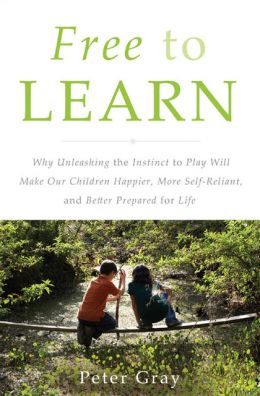 So why did we create schools that so directly “interfere with the children’s natural way of learning”? Gray shows that in tribal cultures the focus of childhood was playing and learning knowledge, skills, and how to live self-sufficiently and honorably.
So why did we create schools that so directly “interfere with the children’s natural way of learning”? Gray shows that in tribal cultures the focus of childhood was playing and learning knowledge, skills, and how to live self-sufficiently and honorably.
When the agrarian revolution increased the need for child labor on farms, the values of school turned to toil, competition and status. While Gray’s view of this is perhaps a bit idyllic, the reality is that modern schools are less concerned with student knowledge, skills, honor or abilities than with the universal goal of job training.
Certainly job training has an important place in advanced society, but Gray is focused on the education of children, and in fact the toll on children in our modern job-obsessed schools is very high. They are way more stressed than earlier generations of children and youth.
Why are we raising a generation of children and youth who are stressed, not secure? Gray’s answer, based on a great deal of research which he outlines in the book, is that we have turned learning into a chore, a task, a labor, rather than the natural result of curiosity, interest, passion to learn, and self-driven seeking of knowledge and skills. In short, we’ve taken too much play out of childhood and too much freedom out of learning.
The results are a major decline of American education in the last four decades. The solution is to put freedom back into education.
Interestingly, Gray suggests that in many of the educational studies of classrooms, schools, homes and teachers that have found a way to successfully overcome these problems and achieve much better educational results, one of the key ingredients is “free age-mixing.” Where students are allowed to freely mix with other students of various ages, without grade levels, the capacity of individuals to effectively self-educate is much higher. As for the impact on college and career success, students from free educational models excel.
This is a good book, and a must read for those who really care about education. I don’t agree with everything the author teaches, but I learned something important on almost every page.
Whether or not you read Free to Learn, all of us who have children or work in education need to do more to promote the importance of increased freedom in education. Gray is a particular fan of “unschooling,” a type of homeschooling and private schooling where parents and teachers set an example of great education, create an environment of excellent learning, and let the kids become self-learners. While this may not be the ideal learning style for every student, it is the best model for a lot of them–and for nearly every young person under age 12.
If you disagree with this conclusion, you simply must read the book. The research is impeccable. If you do agree, the book can help you get to work setting a better example for any students in your life.
Category : event &Featured &History &Leadership &Mini-Factories &Mission &Postmodernism &Prosperity &Statesmanship
Why We Need a Third Party
November 17th, 2012 // 10:36 am @ Oliver DeMille
In the aftermath of the 2012 election, there have been numerous emails, posts, articles and blogs by business owners who say they are planning to sell or close their businesses, or just lay off enough workers that they can afford Obamacare for the employees who remain.
One summary listed the following announced layoffs—all attempts to deal with the new costs of Obamacare:
- Welch Allyn, 275 layoffs
- Stryker, 1170 layoffs
- Boston Scientific, between 1200 and 1400 layoffs
- Medtronic, 1000 layoffs
- Smith and Nephew, 770 layoffs
- Hill Rom, 200 layoffs
- Kinetic Concepts, 427 layoffs
- Coviden, 595 layoffs
- Abbot Labs, 427 layoffs
- St. June Medical, 300 layoffs
There are many, many others.
One email dated November 7, the day after the election, read:
“Time to sell our business. We can no longer afford to provide a living for 14 employees as soon we’re forced to pay for their healthcare. So sad, too bad. On to new ventures.”
After responses about how sad this is and others pointedly blaming the Obama Administration, the same person continued:
“We are all Americans and need to find common ground and make this country great together. I’m not mad at anyone for voting different than me. They love their president, don’t lose friends over calling him a dictator. I’m excited to sell our business. We are adventurous!”
That’s the entrepreneurial spirit that made America great.
Not: “Oh no, we’re losing our job. Will the government help us?”
But rather: “Hey, change happens. We’re excited. This is going to be an adventure!”
That’s the American spirit.
And while rumors abound about how much Obamacare will cost each small business and which won’t have to make any changes at all, there are a lot of employers right now who are very concerned.
Those with under 50 employees aren’t supposed to be hurt, but smaller employers are still worried about exactly how the new laws will be enforced.
Sadly, we will likely see a lot of change in small business in the months and years just ahead.
More regulation, higher taxes and drastically increased costs of employing people will make things more difficult.
An exception may be in network marketing companies or compensated communities.
I’ve long considered them among the top entrepreneurial opportunities in free nations, and with the current changes and policies this is even more true.
“My son is a doctor,” Marge said proudly.
“Wow,” Betty said with a concerned voice. “How is your son dealing with the new regulations coming into effect under Obamacare?” she asked.
Marge nodded and her face grew serious. “He’s very concerned, to tell the truth.”
“Fortunately, my son is building a huge network marketing company, and the regulations aren’t hurting him much,” Betty said. “Maybe your son would like to meet with mine about an opportunity?”
This kind of conversation is taking place a lot right now, and all indications are that it will increase.
Some parents are recommending that their college children put school on hold and start a network business, and I know two medical doctors who have gotten out of the profession in order to build networking businesses.
One of them talked two of his sons into quitting college and doing the same, though the three of them all ended up building networking organizations with entirely different companies.
II. The Party of Small Business
All of this got me thinking today, and as I pondered I realized something. Something big.
Something we really need right now in America.
We need a third party.
Actually, we need a new party that becomes more popular than the Republican Party and the Democratic Party.
There are more independents than members of either big party, so this shouldn’t be too much of a stretch.
Here’s the problem: The Democratic Party is now the unabashed party of big government, the welfare state, rule from Washington D.C., and everything that goes with these values.
The Republican Party touts itself as the party of freedom, limited government, free markets and business, but in fact it is the party of big business and a big-spending government at the same or just slightly lower levels than Democrats.
We have a party of Big Government (with big business as its co-pilot), and another party that emphasizes Big Business (with big government as its co-pilot).
The first is the Democratic Party, the second the GOP.
Neither is now effectively serving the needs of our nation.
As a result, we get bigger government regardless of who gets elected, and big business grows (to the frequent detriment of small businesses) regardless of who is in power in Washington.
In all of this, small businesses, families, communities and the middle class are the losers.
The solution? We need a party of small business.
We need a party whose top priority is the needs of families and small businesses.
This new party needs to reject the big-government and anti-free enterprise values of the Democrats and simultaneously the big-business and anti-immigrant attitudes of Republicans.
It needs to embrace toleration, diversity, reduced government regulations, lower taxes, decreased government spending, incentives for entrepreneurship, a charitable safety net, and incentives for more immigrants to bring their capital, businesses, labor and families to America.
It needs to get rid of the barriers to hiring (such as the increasing required health care costs) and drastically reduce government red tape for small businesses.
It needs to allow more innovation, shrink requirements on licenses and permits and other unnecessary costs that decrease entrepreneurship and growth, and create an environment of seamless partnerships between schools and businesses.
It needs to promote, encourage and incentive a lot more initiative, innovation and entrepreneurialism.
It also needs to push for more creative and independent thinking in the schools and less that is rote, conveyor-belt, and pre-scripted.
It should change the way schools are run, replacing an environment where administrators and bureaucrats feel comfortable to one led by proven innovators and others who have been successful in the real economy, the FOR-profit economy.
Forget teacher certification and unions—if we want to compete in the global economy we need innovators leading our classrooms.
As an example, principals and teachers should be hired who have excelled at implementing successful business plans rather than writing resumes.
And funding should flow to schools that excel in a true free market.
To ensure to that no child is left behind (for example in less-advantaged neighborhoods), even larger premiums should go to innovators who successfully turn dumpy schools into flourishing institutions whose graduates thrive.
The new party should apply similar principles to other kinds of organizations, from health care and community governments to every other sector of the economy.
Small businesses bring the large majority of growth in the economy, and the new party needs to begin with the specific needs of small businesses in mind.
It needs to identify things that hurt small business and repeal them, and find out what helps small businesses succeed and introduce more policies that encourage these things.
It needs to rewrite the commercial and legal code to create an environment where innovation is the norm, along with the values of growth, calculated risk, leadership, creativity, and entrepreneurialism.
It needs to be not the party of jobs, but the party of successful business ownership—and the jobs they naturally create.
III. A Bright Future?
We need a third party. The party of Big Government (with big business as co-pilot) and the party of Big Business (with big government as co-pilot) simply aren’t doing what our nation needs anymore.
It’s time for new thinking and new leadership.
There is an old saying that you can’t pour new wine into old bottles, because the residue of past wine always taints the new.
This is where we are in America.
The current parties, as much good as both have done at times, have peaked and are in decline.
New leadership is needed, along new values untainted by the baggage of two parties whose time has come and gone.
It is perhaps possible to reform one of the parties to get better results, but it is likely that only a new party with an entirely new focus and fresh thinking is going to take America where it needs to go.
Democratic nations are notorious for refusing to change until crisis forces their hand, and I suspect this is what we’ll witness in the 21st Century.
At some point, probably after major crisis and a superhuman American response, we’re going to need a new party.
Those who love freedom should start thinking about what it should look like.
One thing is clear: When it does come, it needs to be a party of small business.
Free enterprise and the entrepreneurial spirit made America great, and it will do so again if we let it.
Whatever comes in the economy, we want to be led by those whose attitude is, “It might sound bad, but this is an exciting adventure! Let’s get started…”
***********************************
 Oliver DeMille is the chairman of the Center for Social Leadership and co-creator of Thomas Jefferson Education.
Oliver DeMille is the chairman of the Center for Social Leadership and co-creator of Thomas Jefferson Education.
He is the author of A Thomas Jefferson Education: Teaching a Generation of Leaders for the 21st Century, and The Coming Aristocracy: Education & the Future of Freedom.
Oliver is dedicated to promoting freedom through leadership education. He and his wife Rachel are raising their eight children in Cedar City, Utah.
Category : Blog &Business &Citizenship &Community &Constitution &Culture &Current Events &Economics &Entrepreneurship &Family &Featured &Government &Independents &Leadership &Liberty &Mission &Politics &Producers &Prosperity &Statesmanship
AFTER THE ELECTION: The Year of Danger
November 8th, 2012 // 5:51 pm @ Oliver DeMille
The year ahead is a time of danger.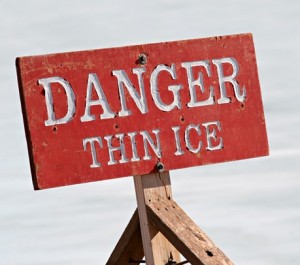
The election of 2012 is over, and you are either happy or upset with the outcome—or, like many independents, you are predictably frustrated with the whole system.
Whatever the case, the next few months is a time of real danger in our nation.
During elections, energy and citizen participation is high.
After elections, it reaches all-time lows. People of all political views tend to focus on other things and leave governance to the politicians.
America has serious challenges ahead, and many of them kick in right at the beginning of 2013.
Moreover, during the next year we will almost certainly determine whether or not the United States is going to fall off the looming financial cliff.
Concerns include:
- The rapidly growing debt
- The overwhelming reality of entitlements
- The growing deficit
- The weakening national credit rating
- The struggling role of the U.S. Dollar as the world’s reserve currency
- Various looming bubbles in the market
- A coming inflation crunch
- A further middle-class squeeze on jobs and discretionary income
- A tax rate that is driving more businesses abroad (or out of business)
- A very nervous small business community that is uncertain about growth or hiring
- Weak consumer demand that is causing businesses to produce less (and cut jobs)
- A rapidly expanding government sector that is threatening free enterprise
Washington needs to address these concerns quickly to relieve business anxiety that we’ll just see more of the same (or worse) from the government for the next four years.
After all, without the necessity of reelection the Obama Administration could be truly anti-business.
Hopefully, in contrast, President Obama will see this as an opportunity to really work with Republicans to fix these major national challenges.
The larger problem is that democratic societies seldom take action until they feel direct pain.
Indeed, democratic nations are notoriously bad at anticipating pain and taking action ahead of time, so they seldom stop crises but rather wait until it is too late to get serious about solutions.
We need real solutions in the months and year just ahead, and we can’t afford to wait for more crises.
We must immediately address the economic realities above (and others like them), at the very time the citizenry is the least likely to stay actively involved.
Whatever your political views, America needs you to stay enthusiastically engaged in watching and influencing government. Now more than ever.
Right now begins the year of danger in government and the future of the economy, and only the first branch of government—the people—can truly ensure that things go well.
The alternative is further major economic downturn.
***********************************
 Oliver DeMille is the chairman of the Center for Social Leadership and co-creator of Thomas Jefferson Education.
Oliver DeMille is the chairman of the Center for Social Leadership and co-creator of Thomas Jefferson Education.
He is the author of A Thomas Jefferson Education: Teaching a Generation of Leaders for the 21st Century, and The Coming Aristocracy: Education & the Future of Freedom.
Oliver is dedicated to promoting freedom through leadership education. He and his wife Rachel are raising their eight children in Cedar City, Utah.
Category : Blog &Citizenship &Current Events &Economics &Entrepreneurship &Featured &Government &Independents &Leadership &Liberty &Mission &Politics
We Have a Problem; We Have a Huge Problem!
September 4th, 2012 // 12:53 pm @ Oliver DeMille
The recent energy and posts about my article on why it is important to vote once again reinforced that we have a seriously, lasting, structural problem in America. Almost everything about the election is promoting this same message, though few have recognized it.
We get all up in arms about this candidate or that, we emotionally buy in to one candidate and then label everyone else by which candidate they support, and we spend a lot of time actively engaged in politics. We blog, we argue, we discuss, we read, we talk politics to friends, family, co-workers and anyone else who will engage.
All of that is great. None of that is the problem. The more energy we give to politics in election years, the better (within the bounds of decency, of course).
No, the problem is that on November 7 most of this passion and behavior will stop. Oh, the most zealous participants in the 2012 election will still be griping or celebrating well into January, but within a about 100 days after the 2013 inauguration, no matter who wins, nearly all Americans will give little thought to politics for the next four years. A few will get involved again during the 2014 midterm election, but the large majority won’t. It won’t be polite anymore to discuss politics at dinner, and most people won’t.
So yes, Houston, we have a problem. As a nation of citizens we mostly ignore our government, a respectable few get excited during elections, and a lot get involved briefly in presidential elections. But we turn off our citizen-passion when elections are over and its time to govern.
And that is precisely the worst time to do it. During elections, candidates are much more likely to listen to the people, to care what the citizenry thinks. So if you’re going to take a break from politics, do it right now. Stay with me and let me tell you why.
The election will come and go, and the leaders of both parties and at all levels (national, state, county, and local) will listen to the people. Here’s the kicker: Then, when the people get back to ignoring politics, the dangerous time will begin. Politicians will focus on governing, and terrible policies that reduce our freedoms will be passed–month after month.
This is how freedom is lost.
The best-case scenario is for the citizens, at the least the vocal ones who care (and you can tell who they are right now during the election season), to be passionate, vocal and deeply involved during elections and also every day between elections.
That’s called citizenship. And it is the basis of all lasting freedom.
No elite group (politicians or a wealthy class or any other) is going to protect the freedom of the people as well as the people. And it doesn’t take 90-100% of the regular people, just about 10-20% who are passionate and vocal. Again, if you are one of those people right now in this election season, you are one of those we need between elections.
In fact, we need you even more between elections, and we need you to be even more vocal, passionate and daily involved than we do now.
“But right now, the politicians will listen, so isn’t this the most important time?” someone will ask.
Answer: Yes, this is a vital, an essential time to use influence while the leaders listen. But when the elections are over and the leaders stop listening, your influence and voice and focused participation will be even more, way more, necessary–because most people like you won’t be doing anything.
WE HAVE A HUGE PROBLEM, and it will begin in earnest on November 7, 2012. We need you to be part of the solution.
I’m not suggesting you do less during the election. I’m suggesting, in fact, that you give it your very best.
Then, starting November 7 and running for the next four years, America needs you to do even more–a lot more.
***********************************
 Oliver DeMille is the chairman of the Center for Social Leadership and co-creator of Thomas Jefferson Education.
Oliver DeMille is the chairman of the Center for Social Leadership and co-creator of Thomas Jefferson Education.
He is the author of A Thomas Jefferson Education: Teaching a Generation of Leaders for the 21st Century, and The Coming Aristocracy: Education & the Future of Freedom.
Oliver is dedicated to promoting freedom through leadership education. He and his wife Rachel are raising their eight children in Cedar City, Utah.
Category : Blog &Citizenship &Culture &Current Events &Government &Independents &Leadership &Liberty &Mission &Politics &Statesmanship












